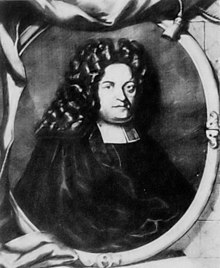Caspar Calvor
Caspar Calvör (born November 8, 1650 in Hildesheim , † May 11, 1725 in Clausthal ) was a German, Lutheran theologian and universal scholar . He is best known as an important cleric of the Baroque era in Lower Saxony, through his correspondence with various important scholars of the time ( Leibniz et al.), Through his work as an educator to the young composer Georg Philipp Telemann and as the founder of an important book collection.
Life
Caspar Calvör was the son of the school principal and pastor Joachim Calvör. In Hildesheim he first went to school until his father went to Braunschweig as a preacher . From 1668 he studied philosophy and theology at the University of Jena . 1672 he moved to the University of Helmstedt , where he on October 8, 1674 to Magister doctorate and self-taught until 1677th
In 1677 Calvör received a call to Zellerfeld as a deacon . The town and the local St. Salvatoris Church were almost completely destroyed in a fire in 1672, and the reconstruction took place during Calvör's tenure. The cities of Clausthal and Zellerfeld were to remain the center of his work until his death, but with increasing supraregional importance.
On May 18, 1679 he married the tenth daughter Catharina Sophie Wiechmann, with whom he was married until her death on August 31, 1704, but had no children. The common will was made on June 3, 1702 a. a. signed by the organ builder Arp Schnitger as a witness.
In 1684 he was appointed superintendent of the Upper Harz communion (parishes of Zellerfeld, Wildemann, Grund, Lautenthal). Here he began his extensive literary and scientific work with almost 30 larger works in German and Latin on topics of theology and liturgy, but also history, archeology and natural sciences. He exchanged letters with leading figures of his time and was a friend of the philosopher Gottfried Wilhelm Leibniz as well as the organ builder Arp Schnitger, who at Calvör's instigation in the o. G. Church of St. Salvatoris 1699–1702 a new organ was created. From 1694 to 1697 Calvör was the educator and musical patron of the young composer Georg Philipp Telemann .
His work made him known beyond the borders of the Harz Mountains, so that various respected church offices and chairs were offered to him. This in turn moved Duke Anton Ulrich von Braunschweig-Wolfenbüttel to make him consistorial and church councilor in 1703. Subsequently, in 1709 he was appointed general superintendent and consistorial councilor in the Principality of Halberstadt and finally in 1710 general superintendent of the Duchy of Grubenhagen (districts Clausthal, Osterode, Herzberg, Einbeck) based in Clausthal.
From 1710 he was also pastor in Clausthal and Ephorus of the local lyceum , to which he appointed his relative Henning Calvör in 1713 .
Caspar Calvör died in 1725 at the age of 74 and was buried in the St. Salvatoris Church in Zellerfeld .
He donated his extensive baroque private library, which at the time of the opening of the will comprised 2,964 volumes with around 8,000 bibliographical units, to the parish of Zellerfeld. The library, which grew to 4,400 volumes with around 11,000 bibliographic units in the following centuries, has been kept in the University Library of Clausthal University of Technology since 1963 under the name “ Calvörsche Library ” .
Fonts
- Sabbath and pre-Sabbath , an excerpt from Guelene's clover leaf (...) from 1691 .
- Sabbath and Pre-Sabbath - Instructions for Silence and Prayer , an excerpt from Guelene's clover leaf (...) from 1691 , by Wilhelm Löhe . Linea, Bad Wildbad 2009, ISBN 978-3-939075-27-1
See also web links to other bibliographies.
literature
- Julius August Wagenmann: Calvör, Caspar . In: Allgemeine Deutsche Biographie (ADB). Volume 3, Duncker & Humblot, Leipzig 1876, p. 717 f.
- Friedrich Wilhelm Bautz : CALVÖR, Caspar. In: Biographisch-Bibliographisches Kirchenlexikon (BBKL). Volume 1, Bautz, Hamm 1975. 2nd, unchanged edition Hamm 1990, ISBN 3-88309-013-1 , Sp. 890.
Web links
- Literature by and about Caspar Calvör in the catalog of the German National Library
- Works by and about Caspar Calvör in the German Digital Library
- Publications by and about Caspar Calvör in VD 17 .
- Calvörsche Library
- CV and literary works of Caspar Calvör
Individual evidence
- ↑ Gottfried Wilhelm Leibniz, Complete Writings and Letters . (PDF; 183 kB) Göttingen, Akademie Verlag, 2006
- ^ Calvör, Casp. In: Johann Heinrich Zedler : Large complete universal lexicon of all sciences and arts . Volume 5, Leipzig 1733, column 331 f.
- ↑ Illustration of the will (possibly a copy) on (Caspar Calvör) Summarischer Lebenslauf . accessed on January 28, 2016.
- ↑ Gustav Fock: Arp Schnitger and his school. A contribution to the history of organ building in the North and Baltic Sea coast areas . Bärenreiter, Kassel 1974, ISBN 3-7618-0261-7 , p. 112-114 .
- ↑ Caspar Calvör's grave. knerger.de
- ↑ Handbook of the historical book inventory in Germany
| personal data | |
|---|---|
| SURNAME | Calvor, Caspar |
| BRIEF DESCRIPTION | German theologian |
| DATE OF BIRTH | November 8, 1650 |
| PLACE OF BIRTH | Hildesheim |
| DATE OF DEATH | May 11, 1725 |
| Place of death | Clausthal |

